- Home
- Lynne Connolly
Yorkshire: Richard and Rose, Book 1 Page 2
Yorkshire: Richard and Rose, Book 1 Read online
Page 2
The manservant led us to a door at the end that opened onto a modest parlour. Here the Earl and Countess of Hareton and the Honourable Edward Golightly waited for us. The men stood while the lady sat in a hard chair before of them. They were all completely rigid. No smiles marred their stern features. They wore perfectly plain garments, the men simulacra of the manservant, the lady in dark blue and white with no lace, only plain linen cuffs to her sleeves and no jewellery.
Nothing approximating comfortable domesticity spoiled the austerity of the little room. No ornaments decorated the old fashioned carved oak mantelpiece, no cushions added comfort to the hard chairs. I found the obsessively spotless parlour as disturbing as the abandoned magnificence we had just left.
Our hosts bowed rigidly, and the lady stood and curtseyed with an awkwardness that indicated she didn’t do it very often The answering bows from the Southwood party were awe inspiring, especially Lord Strang’s, which combined precision and elegance in one graceful gesture. It seemed more elaborate than the bow he had given us in the courtyard, mocking the Haretons with its perfection.
“Welcome,” said Lord Hareton. I felt anything but welcome here. The door opened to admit the manservant returning with a large wooden tray. It held a large teapot and several tea dishes.
There weren’t enough chairs for everyone in this small room, so the ladies sat and the men remained on their feet. Lady Hareton saw to the tea, practically and without comment. The brown teapot, like the one we had in Devonshire for the servants to use, contained a weak infusion, but we found it welcome all the same. The heated cup warmed me in this unfriendly place. Despite the chill outside, the fireplace was cold, the fire unlit.
“I am pleased to see all of you. I thank you for coming.” Lord Hareton’s tones were exaggeratedly formal, perhaps a legacy of his childhood. The formality of the Hareton household had been famous in the last generation; the children forbidden to sit in their father’s presence.
“I am surprised not to see Lord Southwood and his daughter.”
Lord Strang gave him an easy smile. “He sends his apologies. A minor disposition has delayed his arrival with my sister, but he sent me ahead as a token of his good faith.”
Lord Hareton nodded, his mouth a tight line of disapproval. “It is to be hoped that he doesn’t keep us waiting long. I have made arrangements for our family lawyer, Mr. Fogg, to visit us tomorrow. Also, my minister will arrive. I intend to collect him personally in the morning. He uses public transport. He deems private carriages an extravagance, and I tend to agree with him. I do not wish for a long betrothal period, and I would like the contract fulfilled as soon as possible.”
His glance at Lord Strang asked for complaisance, but he didn’t find it.
“Can the lawyer’s visit be deferred?” the younger man asked calmly, but I could hear the passion beneath. Lord Strang was in a temper.
“No, sir, it cannot. There is—”
Lord Strang lifted his chin. “I don’t know if my sister would be content here.”
“Contentment is in God’s hands, not ours.”
Lord Strang ignored the comment and continued to speak. Although his demeanour was rigidly polite, his low tones quivered with the anger beneath. “The betrothal was never a done thing; your father and my grandfather arranged it, but left it to my father and you to fulfil it. I am here as my father’s representative, and if I dislike what I see, I fear I cannot recommend the betrothal to him.”
Hareton smiled. It appeared malicious, but this interpretation surely must be wrong. I preferred the stern look; Lord Hareton had lost most of his teeth, and what remained weren’t in good condition. “Perhaps you need some time to reflect.” He used a soothing tone that made me want to slap him. “I would welcome an opportunity to bring your sister to God’s family. I hope, once you have met Mr. Pritheroe, our minister, you will come to see the error of your ways and join our family.”
Lord Strang stared, his eyes wide in anger and astonishment, momentarily transfixed. Abruptly Lord Hareton turned away and smiled at James. Now our turn arrived.
“I am pleased to welcome you back to my house, Sir James. I’m sorry not to see all of your family, as I requested, but it is not entirely necessary.”
“My younger brother, Ian, had a fall and injured his foot. He sends his apologies.” Lord Hareton nodded in response to James’s explanation. “My younger sister, Ruth, is barely out of the schoolroom and my children are too young to embark on such a long journey.”
Not the whole truth, but it would do. Ian’s injury was far from serious, Ruth was too headstrong and excitable and the thought of those lively children in a coach on a long journey made me shudder. Not to mention the odd rumours we’d heard about the state of the Abbey. We hadn’t imagined matters would be as bad as this, but it had given Martha and James pause.
Lord Hareton continued to speak. “I have asked you here as a witness to the betrothal, and to give you the opportunity to do something for God’s people.” James remained silent. Hareton ignored the rest of us. As women we were probably beneath his notice. I sipped my tea in an effort to appear unconcerned, waiting for the next bombshell. I had no doubt it would come.
“I have asked Mr. Fogg here for another reason. I wish to break the entail.” Seemingly oblivious to the sensation he caused, he continued calmly, “I do not wish to be known as the earl, and I do not wish for the wealth and privilege that go with it. I wish to live as a private citizen. If the entail on the estate is broken, I am free to do that. I cannot prevent or deny the earldom, but I do not have to use it or encourage people to use the title.”
James couldn’t speak. He stared at Lord Hareton rather in the way a rabbit watches a snake, fascinated, waiting for the final, killing stroke.
“Mr. Fogg informs me that in order to break this document, it must be signed by the heir, and the next heir, in line. That is my brother, and you, Sir James.” Our host smiled, as if this explained everything.
“And you want my sister to marry into this?” Mr. Kerre, who had up to now remained silent could no longer keep his indignation to himself. “Not only to live in a mausoleum, but to lose her standing in society, the privileges she has a right to expect?”
“Only by birth,” Lord Hareton responded.
“That is true.” Lord Strang’s quiet, low voice cut through the air, like the voice of reason. “And among those men born to high state, there are a few who deserve it. I don’t want to leave Maria here because it would make her unhappy. She wasn’t born to this. From what I have seen here, I don’t think I can recommend that my father brings her here.”
He paused, glancing around the comfortless room. “I, however, am strangely intrigued by your minister, and I’d like to stay a little longer, if I may.” His brother shot him a sharp glance, but remained silent.
“I am delighted to hear that, sir,” Hareton replied. “Perhaps I can persuade you to change your mind.”
Hareton’s brother, the prospective bridegroom, showed no emotion at all. Intrigued, I wondered what other surprises this strange place held.
Hareton excused himself, saying it was time he went to pray. He looked askance at Steven in his dark clerical garb, but Steven said nothing, avoiding his gaze. I didn’t blame him.
After they left the room, we breathed a collective sigh of relief, and looked around at each other. Lizzie and I exchanged a smile, then a laugh as we felt the oppressive atmosphere slide away. The exotic Kerres seemed normal, next to the extraordinary figures of our cousins.
“When did you last come here, Martha?” I knew, of course, but needed the confirmation. Something to remind me of my normal life, my normal home.
“Ten years ago. The last earl sent for us when we were married. It was different then. Our rooms were magnificent, even though we didn’t have the best ones and a footman stood at every door.”
“A stickler for ceremony by all accounts,” said Lord Strang. “I have to confess there is no indisposition. My father
sent us ahead to form an opinion. He has heard some odd rumours about Lord Hareton, and has serious doubts about the match. Society thinks Hareton is a recluse—they don’t know the half of it.”
“Indeed,” agreed Martha. “It’s all very shocking.”
James looked up from silent contemplation. “I don’t know what to do about this entail. If I refuse to sign it, will it still go through? It’s not that I expect to inherit. Indeed, I don’t wish for it, especially now I’ve seen the property, but I don’t think it’s right. I’ve never heard of such a thing before.” I hated to see my beloved brother so worried. I would gladly have consigned the Haretons and the Abbey to perdition, if it would help him.
“I’m sure I’d feel the same.” Mr. Kerre studied James, his finely shaped lips pursed in thought. “In truth, sir, from what I’ve seen, I think the Hareton estate is bankrupt. He may talk of God and his minister all he likes, but I think his father bankrupted the estate with his extravagance.”
“I’m not so sure,” said Lord Strang. “Why would they leave all the treasures in the Great Hall to rot if that’s the case? I’m sure they could fetch a good price. What’s the rest of the house like?”
James frowned. “You have a point, but on the way here I studied the land. Some of the fields are uncultivated, the animal population is scarce and what buildings I saw are sadly in need of repair.”
“Yes,” agreed Mr. Kerre, “I saw that too. I think you’re right, sir. The Hareton estate is bankrupt.”
My brother heaved a sigh. “So you think I should sign the entail away?”
“I would never presume to tell you what to do, sir,” said Strang, “but in your place, I would seriously consider it. The situation intrigues me. I want to see more of it, but be assured, sir, there will be no wedding. Please feel free to shake the dust of Hareton Abbey from your heels as soon as you wish.”
A maid chose that moment to come in and offer to show us to our rooms. It was early, but we accepted. When I passed James, he murmured to me, “Don’t unpack.”
I nodded.
My room was spotlessly clean, but contained no comforts, and the fireplace was distressingly bare of kindling. All the drapery had gone, just like the parlour downstairs, and when I looked under the bed, it was as spotlessly clean as the rest of the room. I didn’t know which I preferred; the decayed luxury of the Great Hall or the obsessive, bare cleanliness of this wing. Both chilled me to the bone.
My luggage stood in the middle of the floor completely untouched; a very unusual thing in a well-regulated household. However, I wasn’t entirely helpless. I lifted the lid of the trunk and began to unpack. Remembering my brother’s warning, I left most of the items in the trunk. I sighed when I looked at the gown I had bought in Exeter for this visit, and decided to leave it, after fingering the fine silk regretfully. This was no place for finery. Not for me, at least.
When two o’clock arrived, I could dress properly for dinner with some semblance of respectability. I wanted to go down with my sister, but at half past two, I was still waiting for her. It never took me long to dress; I didn’t think overmuch about my appearance any more. I’d reached the advanced age of twenty-five without raising any hopes, but my sister, at twenty, was at the centre of the marriage market. I left her in front of the spotted mirror in her room, as she primped and pouted at her undeniably lovely reflection.
Only when I left the room did I recall that dinner wasn’t for another half hour.
I didn’t want to meet all those strangers on my own, so I decided to explore a little instead.
I wanted to see more of the Abbey. Like Lord Strang, I felt sure there was a mystery here; this great house held more than bankruptcy. Deliberately, I turned in the opposite direction to which I had come. My romantic soul demanded it and my curiosity rampaged across my more sensible emotions.
At the end of the passage, it turned dark. I soon discovered why. The windows here hadn’t been cleaned for an age. They were begrimed with years of dirt, misting the light that fought its way through them. I wished I’d brought a candle, but someone might see me, and realise I shouldn’t be there. Who would have thought I would need a candle at this time of day?
I turned a corner and opened a door at random, drawing a deep breath when I saw what lay inside.
I recalled Lord Strang’s earlier comment because this room came straight out of Sleeping Beauty’s castle. No neat covers hid any of the fine furnishings from the obscuring dust. It hadn’t been a State Room, but a small room which contained some fine objects, the sort of treasure room often found in great country houses. Cobwebs covered the chandelier above me, adding their own ghostly comment on the scene below. The air smelled of damp decay. I drew my handkerchief over a small round table, revealing the elaborate, expensive marquetry that decorated it. Damp had raised the fine woodwork to irreparable ruin. Even the ornaments remained in their places on the mantelpiece, dotted about the room in casual, gruesome disarray, as if their owner had just stepped out, never to return.
I went to the window, careful not to let my skirt touch the exquisitely filthy furniture and rubbed a viewing hole in the window.
Suddenly, a pair of hands seized me from behind. One went round my waist and the other over my mouth. I froze in terror.
Chapter Two
“I saw you come in here,” a male voice murmured. “Don’t shout out.”
I breathed out in relief when I recognised the voice, and then tensed again when I remembered what lay between us.
He released me and I turned around to confront him. I didn’t like him so close. Not any more. Steven’s garb of sober, clerical black only served to accentuate his dark good looks. So confident, so sure of himself. I moved hastily out of his reach.
“Not here, Steven.” My voice still trembled in shock. When he heard it, he smiled. “Someone might come along.”
“We can always close the door.” He moved toward it. His look spoke of stolen kisses and dalliance.
“No,” I replied, uncomfortably aware of his meaning. I had no wish to be alone with Steven, with the door closed.
He came back to me, took my hand and smiled in the heart-stopping way I had loved so much mere months ago. “What’s made you so missish?”
Even now, I found his smile immensely attractive, but now I knew about the vanity and ambition beneath.
When Steven had arrived at our parish twelve months ago, the young ladies of the district vied for his attention—not all of them in ladylike ways. However, none of them took him too seriously after they discovered he was penniless; so, twenty-five and desperate to be off the shelf, I won. Now I knew my family connections, rather than my looks or personal appeal drew him to me, although at first I let myself think he’d fallen as passionately in love as he’d told me. I was wiser now.
Steven used his grip on my hand to swing me into his arms in a way that knocked the breath out of me. It had excited me once, but now I found it oppressive. He bent his head to kiss me, but I made this impossible by chattering at him, caught in panic. “A strange place, this.” My voice came faster and higher than usual, as I tried desperately to put off the inevitable. Steven ignored my attempts at conversation, my obvious desire to be free.
When he pulled me closer I tried to push away but he only smiled, and I grew worried. My voice rose, “Please, Steven, let me go, I don’t think—”
We heard a sound, footsteps close by, easily discernible in the hush of this desolate house. Steven released me, leaving me breathless, ruffled and tremulous. Whoever approached had heard us, because the footsteps quickened, coming closer.
To my deep embarrassment, into the room strode Lord Strang and Mr. Gervase Kerre, both dressed for dinner in the most up to date, finest fashion. They filled the gloomy room with their vitality, the jewelled colours of their attire bright against the room’s muted tones. I was mortified.
Steven didn’t seem in the least disturbed by their entrance, but I coloured up and turned my heated face to the
window.
“Good afternoon,” said Lord Strang. “I trust we haven’t interrupted anything.”
“Not at all,” Steven replied in the same urbane tones, volunteering no explanation. I tried to recover my composure, but couldn’t face anyone yet. I felt so ashamed, though I’d done nothing really wrong. Being discovered here, as though I had arranged a tryst, was enough.
“The gardens are a little overgrown, are they not?” Mr. Kerre strolled to the window and stood by my side. I smelled his perfume, an unusual rich, musky scent I hadn’t noticed before. It was a welcome change from the dankness.
“Any more and they’ll be positively fashionable.” His brother must be referring to the current rage for “wildernesses”. He came to my other side, not standing too close. He smelled of something citrus and floral. I breathed it in.
They had neatly boxed me off from the curate. Steven couldn’t come anywhere near me. I felt even more ashamed to be discovered in such circumstances, but grateful for their assistance. We looked out of the clean patch on the window I’d made with my handkerchief.
“I don’t think our stay will be protracted, but while we are here, I should like to see more of this house.” Lord Strang drew one delicately manicured finger across the dusty pane, before drawing the digit away and regarding it thoughtfully, as if surprised to see the dirt. I gave him my soiled handkerchief, which he accepted with a small smile. He wiped his finger, returning it to me after carefully folding the soiled part inside the cloth.
“I’ll have to change it before I go downstairs,” I said, grateful to find an excuse to leave.
“If you’ll allow me, I’ll escort you.” Lord Strang didn’t gave me a way out of the situation that I was thankful to take. He moved past Steven to the door, opening it for me. We walked out of the room, leaving Mr. Kerre and Steven behind.

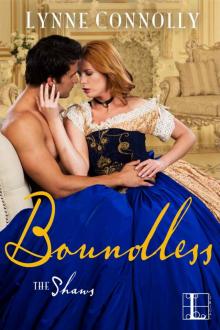 Boundless (The Shaws)
Boundless (The Shaws)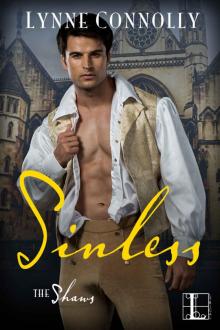 Sinless (The Shaws)
Sinless (The Shaws) The Girl with the Pearl Pin
The Girl with the Pearl Pin Hosts to Ghosts Box Set
Hosts to Ghosts Box Set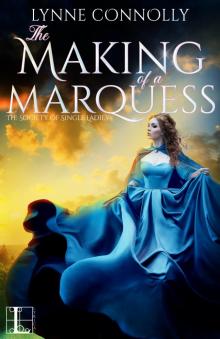 The Making of a Marquess
The Making of a Marquess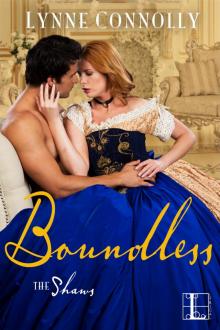 Boundless
Boundless Beauty of Sunset
Beauty of Sunset Virginia And The Wolf
Virginia And The Wolf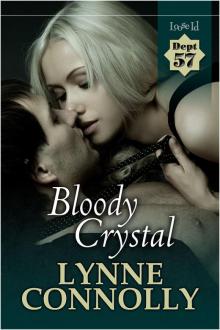 Department 57: Bloody Crystal
Department 57: Bloody Crystal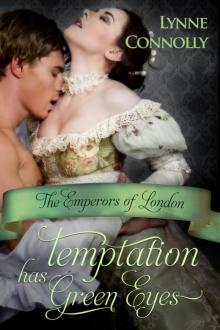 Temptation Has Green Eyes
Temptation Has Green Eyes Forged by Love: Even Gods Fall in Love, Book 4
Forged by Love: Even Gods Fall in Love, Book 4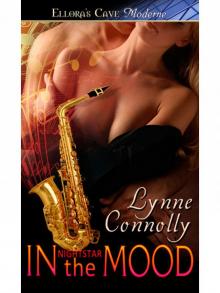 IntheMood
IntheMood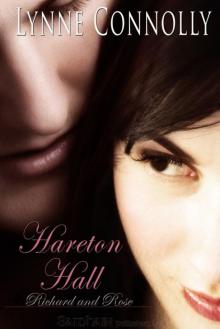 Hareton Hall: Richard and Rose, Book 6
Hareton Hall: Richard and Rose, Book 6 ShiftingHeat
ShiftingHeat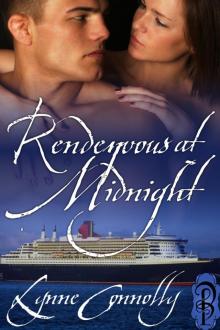 Rendezvous at Midnight
Rendezvous at Midnight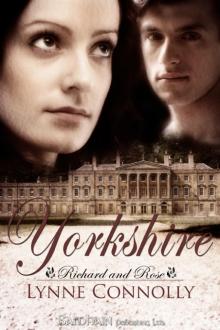 Yorkshire: Richard and Rose, Book 1
Yorkshire: Richard and Rose, Book 1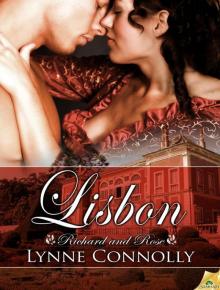 Lisbon: Richard and Rose, Book 8
Lisbon: Richard and Rose, Book 8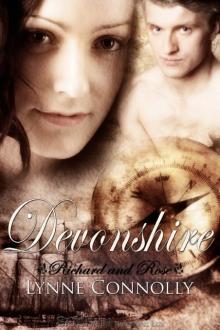 Devonshire: Richard and Rose, Book 2
Devonshire: Richard and Rose, Book 2 Venice
Venice War Chest: Even Gods Fall in Love, Book 5
War Chest: Even Gods Fall in Love, Book 5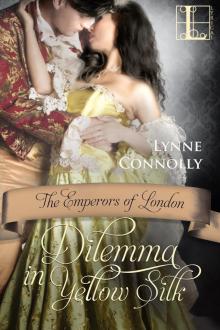 Dilemma in Yellow Silk (Emperors of London)
Dilemma in Yellow Silk (Emperors of London)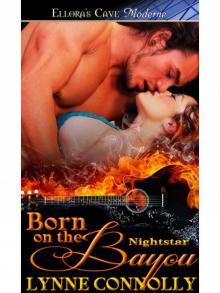 BornontheBayou
BornontheBayou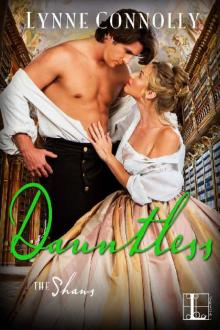 Dauntless (The Shaws)
Dauntless (The Shaws) Brutally Beautiful
Brutally Beautiful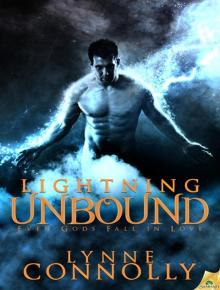 Lightning Unbound: Even Gods Fall in Love, Book 1
Lightning Unbound: Even Gods Fall in Love, Book 1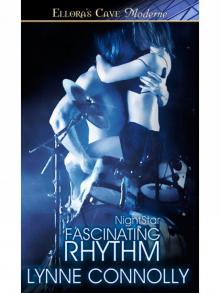 FascinatingRhythm
FascinatingRhythm Fearless
Fearless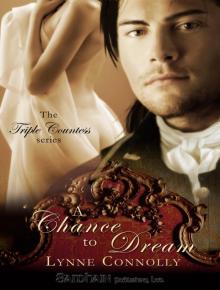 A Chance to Dream
A Chance to Dream Mad for Love: Even Gods Fall in Love, Book 2
Mad for Love: Even Gods Fall in Love, Book 2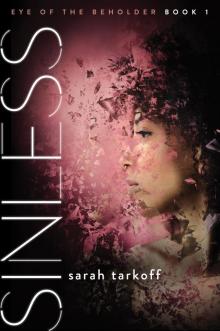 Sinless
Sinless SailtotheMoon
SailtotheMoon Wild Lavender
Wild Lavender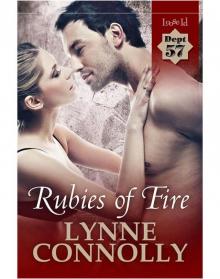 Department 57: Rubies of Fire
Department 57: Rubies of Fire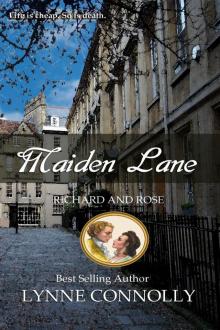 Maiden Lane
Maiden Lane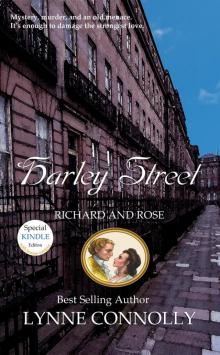 Harley Street
Harley Street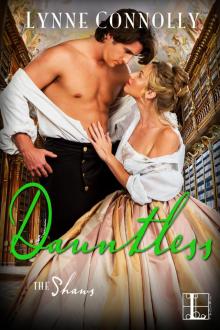 Dauntless
Dauntless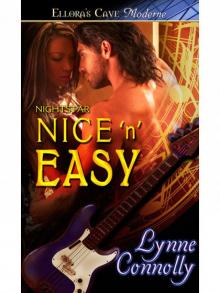 NicenEasy
NicenEasy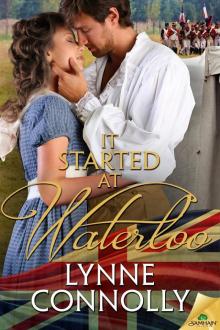 It Started at Waterloo
It Started at Waterloo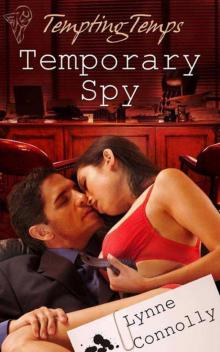 Temporary Spy
Temporary Spy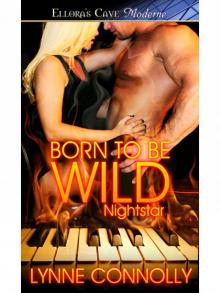 BorntobeWild
BorntobeWild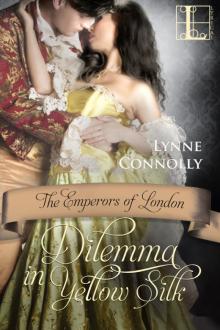 Dilemma in Yellow Silk
Dilemma in Yellow Silk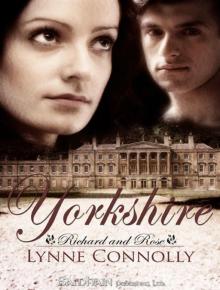 Yorkshire
Yorkshire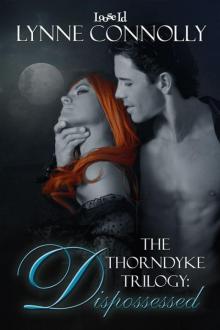 The Thorndykes 1: Dispossessed
The Thorndykes 1: Dispossessed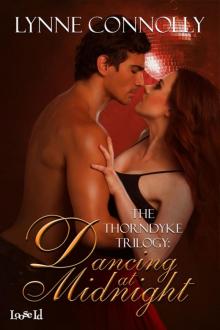 The Thorndyke Trilogy 2: Dancing at Midnight
The Thorndyke Trilogy 2: Dancing at Midnight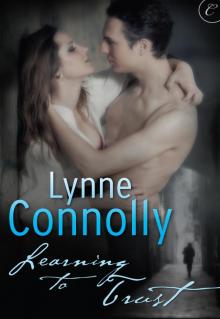 Learning to Trust
Learning to Trust Her Quicksilver Lover: Even Gods Fall in Love, Book 6
Her Quicksilver Lover: Even Gods Fall in Love, Book 6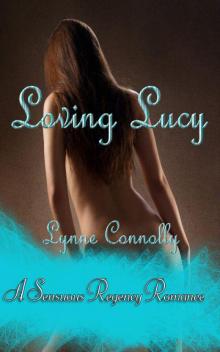 Loving Lucy
Loving Lucy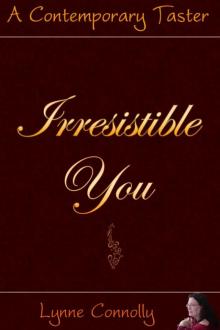 Irresistible You
Irresistible You Arrows of Desire: Even Gods Fall in Love, Book 3
Arrows of Desire: Even Gods Fall in Love, Book 3 Unbroken
Unbroken Devonshire
Devonshire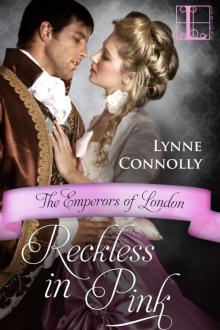 Reckless in Pink
Reckless in Pink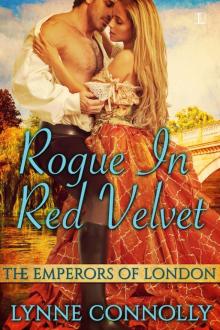 Rogue in Red Velvet
Rogue in Red Velvet